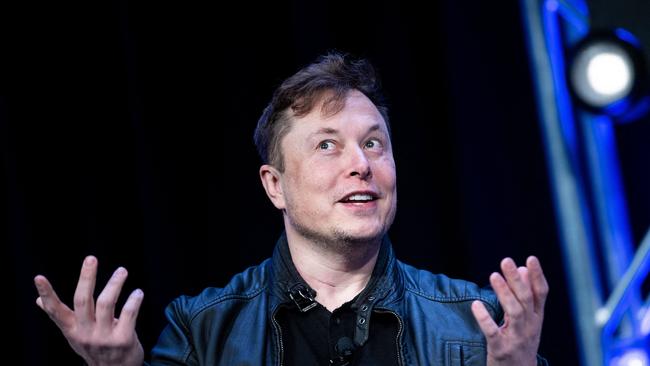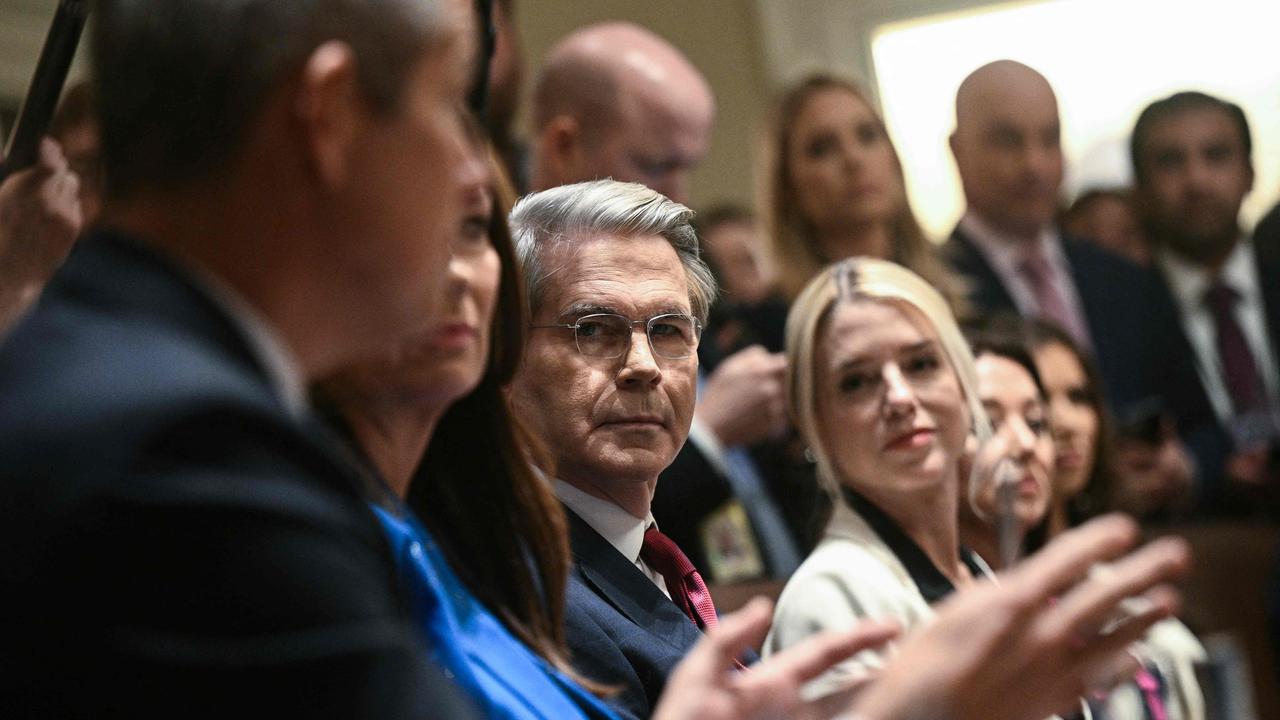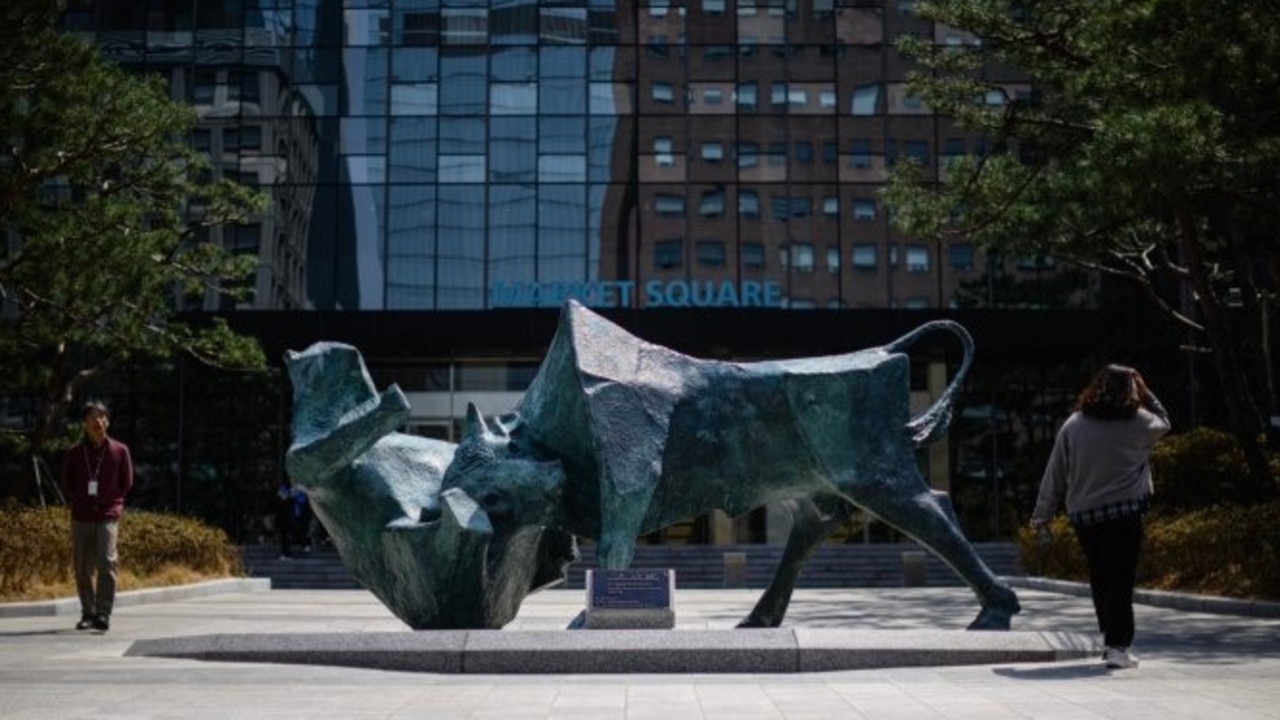Elon Musk’s tax bill on stock options fell along with Tesla’s share price
Sliding stock price lowers Elon Musk’s tax bill by about $US380m from peak but also limits deductions the EV maker can take.

Elon Musk already faces a federal tax bill approaching $US2.7bn ($A3.74bn) on exercising Tesla stock options. It would have been bigger if the company’s share price hadn’t fallen after he tweeted about selling stock.
The stock fluctuations have financial consequences for the US government, Mr Musk and Tesla. When the share price goes down, it not only reduces how much tax the Tesla chief executive owes the US government in the short term, it also lowers his total potential tax payments linked to those shares if he sells them in the future. Any such later sales also may not be taxed by California because Mr Musk moved his residence to Texas last year.
At the same time, exercising the options at a lower stock price could weigh on the company he controls. The tax deductions that Tesla can claim for that part of Mr Musk’s compensation package are effectively reduced if he exercises options at lower share prices.
The electric-vehicle maker’s chief executive initiated a wave of exercising Tesla options and selling shares on November 8, and he has now turned more than six million options into shares, selling about $US3bn worth to cover tax withholding along with about $US6bn of other shares.
Mr Musk made the moves while arguing with lawmakers over tax policy and after conducting a Twitter poll about whether he should liquidate 10 per cent of his stockholdings in Tesla, a plan Twitter users backed. Tesla’s stock slumped more than 15 per cent in the week following the Twitter poll, a period that also included the market debut of electric-vehicle rival Rivian Automotive.
The stock-price declines had a significant impact on the tax he owes, lowering it by more than $US380m so far from its recent all-time peak, an analysis by The Wall Street Journal of Mr Musk’s and Tesla’s securities disclosures shows.
The tax figures are estimates; his actual bills may vary.
On September 14, weeks before his first public comments about selling or his Twitter poll, Mr Musk had authorised a plan under which he would exercise at least some of his nearly 23 million vested stock options set to expire worthless in August 2022.
The day he set the plan, Tesla shares closed at $US744.49. At that price, exercising the options would have cost him $US290.50 in federal taxes per share. A day earlier, congressional Democrats had proposed raising tax rates that, if enacted, would mean options exercised in 2022 at that day’s price would cost Mr Musk $US331.84 each.
Mr Musk, the world’s richest person on paper with a net worth of more than $US300bn, according to the Bloomberg Billionaires Index, doesn’t take a cash salary from Tesla and has at times described himself as cash-poor. Before November, he rarely sold Tesla stock. In September, he publicly signalled that he would face what he called a huge tax bill on exercising options.
Tesla’s shares have risen sharply since September. The company posted strong quarterly results, and rental-car company Hertz Global Holdings Inc. said it had ordered 100,000 Tesla’s, sending the valuation of Mr Musk’s company above $US1 trillion.
On November 4, before Mr Musk exercised an option under the plan or disclosed its existence, Tesla stock hit an all-time closing high of $US1,229.91 a share. At that price, Mr Musk could expect a federal tax bill of about $US481.51 for each option he exercised and even more in 2022 under the stiffer Democratic social spending and climate bill that passed the House November 19.
Mr Musk has reported exercising roughly 6.4 million options through November 19, and his average federal tax cost per share is about $US421.59. That is higher than it would have been in September but more than 12 per cent, or $US382m, below the early November highs. Because he is selling newly obtained shares to pay the taxes, he generally ends up with the same number of shares regardless of the price, just at a lower cost basis and with less cash owed to the government than when the price was higher.
Neither Mr Musk nor the electric-vehicle company responded to requests for comment. They haven’t disclosed the details of the preset trading plan. Such plans can prompt sales or purchases at specific dates or share prices.
As Mr Musk continues to exercise his options, his tax bill shrinks if Tesla’s share price falls, but the company fares worse — it gets smaller tax deductions for Mr Musk’s compensation at lower share prices. For every $US1 million that Mr Musk’s option-exercise income goes down, he saves $US370,000 in federal income taxes, and Tesla loses $US210,000 worth of deductions.
That tension can be lessened when the fortunes of a company and its largest shareholder are intertwined if they are trying to get the lowest combined tax bill.
“You can see there may be an incentive in combination for the parties to lowball the value, that Tesla only gets a 21 per cent deduction and Musk is picking it up at 37 per cent,” said Steve Rosenthal, senior fellow at the Tax Policy Center in Washington. “Every dollar lower saves, collectively, 16 cents for the two parties.”
Mr Musk, in a November 13 tweet, pointed to his sales of Tesla stock that he had held for a longer time than the ones just obtained by options. He owes more in capital-gains tax than he would have if he had instead sold his newly obtained shares. “A careful observer would note that [this is] … closer to tax maximisation than minimisation,” he wrote.
Mr Musk’s tax for exercising his options is calculated on the difference between the price he has to pay to exercise the option, the so-called strike price, and the value of the shares when the option is exercised. The options that expire in August cost $US6.24 to exercise and the difference between that and the actual share price is taxed as ordinary income. That is a 37 per cent top tax rate plus 2.35 per cent in Medicare taxes and likely more in California taxes because he lived and worked there during part of the time he held the options.
Even for a long-term holder of Tesla stock, as Mr Musk has been, there are other reasons a near-term share dip around the time of exercising options benefits him as he increases his holdings.
If Mr Musk thinks Tesla is a good long-run investment above current prices, his incentive is to spend as little money as possible to secure more shares. Unlike a typical stock sale where the executive ends up with more cash after taxes if the share price is higher, these transactions are different. They typically require him to spend cash or surrender shares and leave him with shares, but not cash.
Beyond that, future gains above the exercise price are taxed as capital gains. If held for more than a year and then sold, that means a 23.8 per cent rate under current law or a 31.8 per cent rate under the Democratic plan, both lower than ordinary income tax. Those gains also would likely not be taxed in California, because Mr Musk moved to Texas last year.
If Mr Musk, 50 years old, holds those shares until his death, he wouldn’t pay any income tax, a policy he labelled “questionable.” His heirs would receive the shares and would owe income taxes only when they sell and then only on the further appreciation after his death. Estate taxes may apply.
“Probable capital allocation skill of heirs is lower than original creator,” he tweeted this month, “so I am in favour of an estate tax.”
Theo Francis contributed to this article
The Wall Street Journal



To join the conversation, please log in. Don't have an account? Register
Join the conversation, you are commenting as Logout